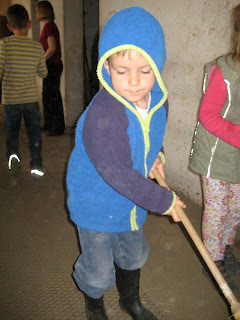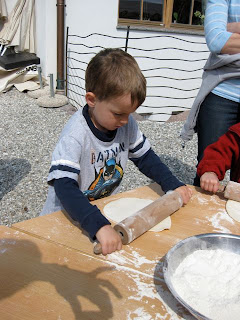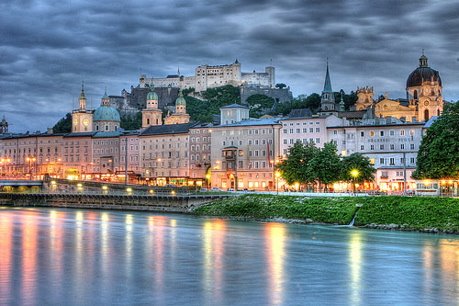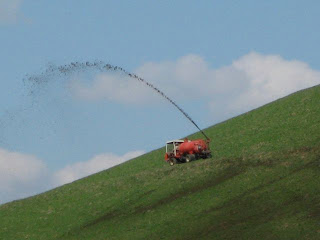 Animation used to have a much different meaning for me. Cartoons are what I always thought of. Since Turkey, though, animation has come to mean “Kindergruppe”.
Animation used to have a much different meaning for me. Cartoons are what I always thought of. Since Turkey, though, animation has come to mean “Kindergruppe”.In Turkey, there were people in our hotel who entertained both kids and adults. The kids had a play room where one person was on duty. The adults had people getting them to play darts and bachi ball on the beach. At night, the animation crew would lead adults in karoeke and dancing. Because it was off season, there were only ever a couple of other kids around so there wasn’t much appeal for Nikolas to hang out in the play room.

Here at Familhotel Sonnwies, it’s a very different story. First of all, it’s a family hotel. Second, it’s Easter vacation so kids are off from school. There isn’t a room in the hotel occupied by people without kids, so there are playmates of all sizes here.
 The animation crew is made up of four young woman, all from South Tyrol although one seems to be primarily Italian-speaking.They’re all very nice and they play well with children. They publish the list of things to do each day so that you can read at breakfast what the crew has in store for the kids. This allows parents to talk up the activities to get them excited about leaving their parents for hours at a time and playing with people they’ve only just met.
The animation crew is made up of four young woman, all from South Tyrol although one seems to be primarily Italian-speaking.They’re all very nice and they play well with children. They publish the list of things to do each day so that you can read at breakfast what the crew has in store for the kids. This allows parents to talk up the activities to get them excited about leaving their parents for hours at a time and playing with people they’ve only just met. Nikolas has had some reservations from time to time. The first and only cry came the second evening. It was the weekend so the only activities were playing in the late afternoon, eating dinner together, then playing afterward. We took Nikolas down to the enormous play area after dinner, knowing that he wouldn’t want to leave us for the meal. We signed the paperwork with contact and room numbers and I watched Nikolas out of the corner of my eye pacing around in circles. I said, “How you doing?” Instantly, his face crumpled up with sadness and he bawled and bawled. Poor guy! After some discussion, he agreed that he could play with all the fun stuff (building blocks, riding tractors, slide, games) if Papa sat out on the terrace (right outside the big window to the play room) and Mommy sat in the entrance room where kids took off their shoes.
Nikolas has had some reservations from time to time. The first and only cry came the second evening. It was the weekend so the only activities were playing in the late afternoon, eating dinner together, then playing afterward. We took Nikolas down to the enormous play area after dinner, knowing that he wouldn’t want to leave us for the meal. We signed the paperwork with contact and room numbers and I watched Nikolas out of the corner of my eye pacing around in circles. I said, “How you doing?” Instantly, his face crumpled up with sadness and he bawled and bawled. Poor guy! After some discussion, he agreed that he could play with all the fun stuff (building blocks, riding tractors, slide, games) if Papa sat out on the terrace (right outside the big window to the play room) and Mommy sat in the entrance room where kids took off their shoes. By the next day, though, he’d gotten used to the idea. With visits to the animals in the morning, a pony ride, animal feeding, and a parachute game in the afternoon (with intermittent visits to Mommy and Papa to get some extra love), he was convinced that Kindergruppe wasn’t a bad thing at all! Since then, there have been some times when he wasn’t too sure if he wanted to go along with the kids, but he wasn’t alone. Everyday, we saw parents and their young kids dealing with some separation anxiety.
By the next day, though, he’d gotten used to the idea. With visits to the animals in the morning, a pony ride, animal feeding, and a parachute game in the afternoon (with intermittent visits to Mommy and Papa to get some extra love), he was convinced that Kindergruppe wasn’t a bad thing at all! Since then, there have been some times when he wasn’t too sure if he wanted to go along with the kids, but he wasn’t alone. Everyday, we saw parents and their young kids dealing with some separation anxiety. By the end of the week, he’d put together quite an impressive list of activities: feeding cows, pigs, and rabbits, sweeping the stall several times, riding ponies on three separate days, playing with homemade play-dough, brushing the horses, playing two types of lawn games, Easter activities (nest building, egg coloring, bread baking), playing in a big sandbox, jumping on trampolines, and eating several meals with other kids. I’d say he had quite a vacation. That’s not even mentioning swimming with us every morning and going into Brixen and Bolzano on day trips.
By the end of the week, he’d put together quite an impressive list of activities: feeding cows, pigs, and rabbits, sweeping the stall several times, riding ponies on three separate days, playing with homemade play-dough, brushing the horses, playing two types of lawn games, Easter activities (nest building, egg coloring, bread baking), playing in a big sandbox, jumping on trampolines, and eating several meals with other kids. I’d say he had quite a vacation. That’s not even mentioning swimming with us every morning and going into Brixen and Bolzano on day trips.What it’s meant for us is that we’ve had some time to do our own things, some of which we’d almost forgotten we like to do such as read a paper! But we’re also not alone in this regard. A German mother of three young kids told me that she’s read three books this week, a feat she hasn’t been able to accomplish over the course of a year!







